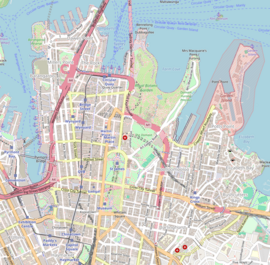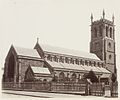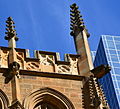St Philip's Church, Sydney
| St Philip's Church | |
|---|---|
 | |
Location in Greater Sydney | |
| Location | 3 York Street, Sydney CBD, New South Wales |
| Country | Australia |
| Denomination | Anglican Church of Australia |
| Churchmanship | Low Church |
| Website | churchhillanglican |
| History | |
| Status | Church |
| Dedication | Philip the Apostle in honour of Captain Arthur Phillip, RN |
| Associated people | Notable former clergy: |
| Architecture | |
| Functional status | Active |
| Architect(s) | Edmund Blacket |
| Architectural type | Victorian Academic Gothic with English Perpendicular detail |
| Years built | 1848-1858 |
| Specifications | |
| Materials | Sandstone, slate roofing, timber flooring, trusses and stairs, ceramic tiles |
| Administration | |
| Diocese | Sydney |
| Clergy | |
| Rector | Justin Moffatt |
| Assistant | Rt. Rev. Robert Forsyth |
Former New South Wales Heritage Database (Local Government Register) | |
| Official name | St Philip's Church of England Including Interior and Grounds |
| Type | Local government heritage (built) |
| Criteria | a., c., d., f., g. |
| Delisted | 14 December 2012 |
| Reference no. | I1972 |
| Category | Church |
| Type | Religion |
| Builder | Unknown |
St Philip's Church, Sydney, is the oldest Anglican church parish in Australia. The church is located in the Sydney city centre between York Street, Clarence and Jamison Streets on a location known as Church Hill. It is one of two churches in the Anglican Parish of Church Hill (the other being Holy Trinity, Miller's Point). Together, they are known as Church Hill Anglican. St Philip's is part of the Diocese of Sydney, Australia.[1] The church is listed on the (now defunct) Register of the National Estate.[2]
History
[edit]The original church was built using convict labour by orders of the colony's first chaplain, the Reverend Richard Johnson, in June 1793. The wattle and daub construction church was burnt down by convicts in 1798.[3] A second, stone, church operated on the current site of Lang Park, Church Hill, from 1810 to 1856. It was made from poor materials and gained a reputation as "the ugliest church in Christendom". This second church had a 150-feet high, round clock tower.[4]
The original parish was named St Phillip's Church[5] in honour of the first Colonial Governor, Captain Arthur Phillip, RN.[6] but from around 1840 the spelling "St Philip's" predominated, and was mandated in 1848 with commencement of the new building.[7]
The current building on York Street is the second church building on Church Hill (the wattle and daub church was built on the corner of Bligh and Hunter Streets), and was designed by Edmund Blacket in the Victorian Gothic style with English Perpendicular detail. It was built 1848-56. The church tower was styled after Magdalen Tower at Oxford, United Kingdom, and was opened in 1856.
The bells were cast by Charles and George Mears at the Whitechapel Bell Foundry in East London in 1858.[8]
During World War II the hall was used as a hostel for women officers, who were on leave in Sydney. This was in partnership with the Church of England National Emergency Fund[9]
Parish
[edit]On 1 November 2013 St Philip's merged with Holy Trinity Garrison Church in Millers Point to form a joint parish using both buildings for combined ministry.[10]
Clergy
[edit]Prominent clergy in the life of the church include William Cowper, his son William Cowper (the first Australian-born cleric),[11] T. C. Hammond, Sydney James Kirkby and a former Archbishop of Sydney, Donald Robinson.
The church is part of the Parish of Church Hill, and so is called Church Hill Anglican (together with The Garrison Church) and the current rector is Justin Moffatt, who was previously at Christ Church, New York City.[12]
Gallery
[edit]- A sketch of the original building[13]
- St Philip's in 1872
- St Philip's School in 1872
See also
[edit]References
[edit]- ^ "Our History". St Philip's York Street Anglican. Retrieved 28 November 2013.
- ^ The Heritage of Australia; Macmillan Company, 1981, p. 2/110
- ^ "Cowper Family in Australia - Cowper 200 Celebrations - Rev William Cowper". Cowper200.com.au. Retrieved 24 July 2012.
- ^ "Early Australian Architectural History". Sydney Architecture. Retrieved 24 July 2012.
- ^ "Settling the Settler". The Evening News (Sydney). No. 12, 193. New South Wales, Australia. 9 July 1906. p. 6. Retrieved 14 February 2023 – via National Library of Australia.
- ^ "St Philip's Church of England Including Interior and Grounds". New South Wales Heritage Database. Office of Environment & Heritage. Retrieved 30 September 2017.
- ^ "St Phillip and St Philip". Sydney Morning Herald. No. 28, 428. New South Wales, Australia. 14 February 1929. p. 6. Retrieved 14 February 2023 – via National Library of Australia.
- ^ "Tower of St Philips, Church Hill, Sydney". Construction and Local Government Journal (NSW : 1913 - 1930). NSW: National Library of Australia. 9 February 1927. p. 13. Retrieved 12 December 2013.
- ^ "Club for Women Officers — Opening by Lady Gowrie". The Sydney Morning Herald. No. 33,263. New South Wales, Australia. 3 August 1944. p. 6 – via National Library of Australia.
- ^ Gilbert, Nick (3 October 2011). "York Street, Miller's Point parishes to merge". Sydney Anglicans. Retrieved 6 August 2014.
- ^ "Cowper Family in Australia - Cowper 200 Celebrations - Rev William Cowper". Cowper200.com.au. Retrieved 24 July 2012.
- ^ "Moffatt comes home to York Street | Sydney Stories". Sydneyanglicans.net. 16 June 2012. Retrieved 24 July 2012.
- ^ "Untitled". Australian Town and Country Journal (NSW : 1870 - 1907). NSW: National Library of Australia. 28 January 1888. p. 21. Retrieved 12 December 2013.
External links
[edit] Media related to St Philip's Church, Sydney at Wikimedia Commons
Media related to St Philip's Church, Sydney at Wikimedia Commons


 French
French Deutsch
Deutsch
![A sketch of the original building[13]](http://upload.wikimedia.org/wikipedia/commons/thumb/b/bf/St_Philips_Church_Hill_Sydney_Original_Building.png/120px-St_Philips_Church_Hill_Sydney_Original_Building.png)





